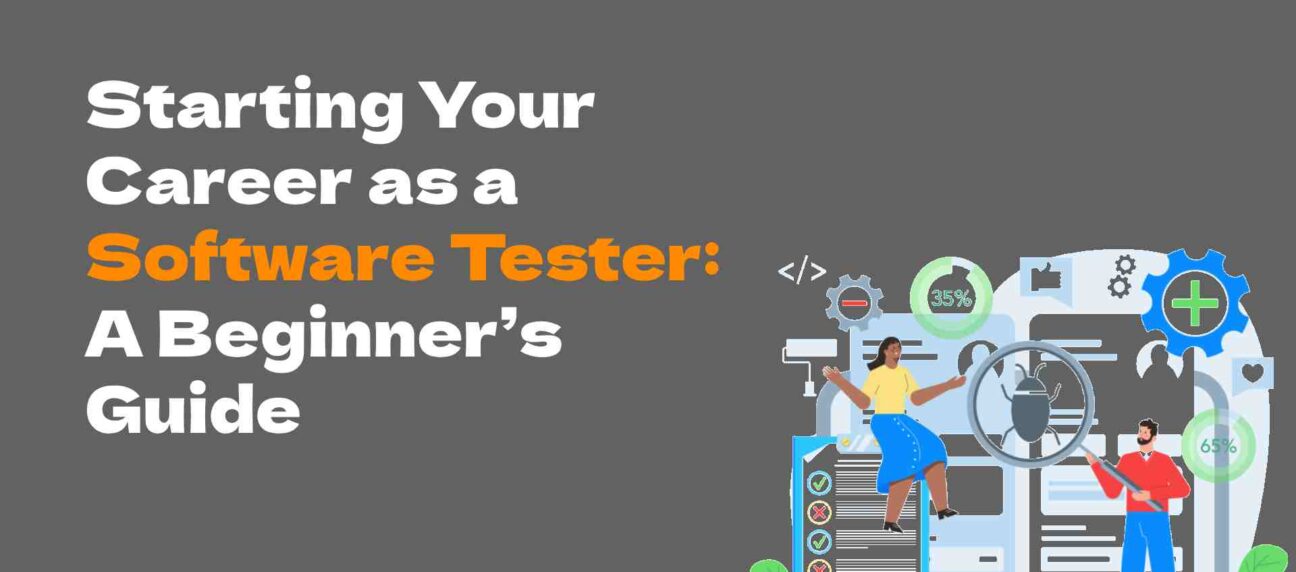Software testing is a critical aspect of the software development lifecycle, ensuring the delivery of high-quality products. If you have an eye for detail, a logical mindset, and a passion for technology, a career as a software tester can be both fulfilling and in-demand.
This blog will guide you through the steps to start your career as a software tester, covering essential skills, tools, and certifications to set you on the path to success.
Who is a Software Tester?
A software tester is responsible for identifying bugs, errors, or issues in software applications to ensure they meet quality standards. Testers work closely with developers, project managers, and business analysts to validate that the software functions as intended.
Types of Software Testing
Software testing can be broadly categorised into:
- Manual Testing: Involves manually executing test cases without the use of automation tools.
- Automation Testing: Uses tools and scripts to automate repetitive test cases, increasing efficiency and accuracy.
Why Choose Software Testing as a Career?
- High Demand: The tech industry constantly needs skilled testers to ensure software quality.
- Career Growth: Opportunities to specialise in automation, performance testing, or quality assurance management.
- Diverse Domains: Work in various industries like healthcare, finance, gaming, and e-commerce.
- Problem-Solving Role: Be at the forefront of improving software reliability and user satisfaction.
Steps to Start Your Career as a Software Tester
1. Understand the Basics of Software Testing
Begin by learning the fundamentals of software testing. Familiarise yourself with key concepts, including:
- Types of testing (functional, regression, smoke, performance).
- Software testing lifecycle (STLC).
- Software development lifecycle (SDLC).
Online resources like Coaching Wallah Tutorial and ISTQB Foundation materials and free tutorials are excellent starting points.
2. Learn Testing Tools and Techniques
Proficiency in tools is essential for a software tester. Start with manual testing and gradually explore automation tools.
Popular Manual Testing Tools:
- JIRA
- TestLink
- Bugzilla
Popular Automation Testing Tools:
- Selenium
- Appium
- Postman (for API testing)
- JMeter (for performance testing)
3. Acquire Programming Knowledge
While manual testing doesn’t require coding, automation testing often involves scripting. Learn basic programming concepts and languages like:
- Python
- Java
- JavaScript
Start with simple projects to get hands-on experience in scripting and test case development.
4. Practice Writing Test Cases
Test cases are the backbone of the testing process. Practise writing detailed and effective test cases for various scenarios. Use online resources or practice platforms to improve your skills.
5. Gain Certifications
Certifications validate your skills and knowledge, making you a competitive candidate in the job market. Some widely recognised certifications include:
- ISTQB Foundation Level
- Certified Software Tester (CSTE)
- Certified Agile Tester (CAT)
- Coaching Wallah Certification
6. Build a Portfolio
Showcase your testing skills by building a portfolio. Include:
- Sample test cases.
- Bug reports.
- Experience with tools and testing scenarios.
You can create your portfolio by testing open-source applications or volunteering for small projects.
7. Apply for Internships or Entry-Level Roles
Internships provide hands-on experience and help you understand real-world challenges. Look for roles such as:
- QA Tester
- Test Analyst
- Junior Automation Tester
Networking on platforms like LinkedIn and attending tech meetups can help you find opportunities.
8. Keep Learning and Growing
Software testing is a dynamic field, and staying updated with new tools, methodologies, and technologies is crucial. Participate in webinars, join testing forums, and enrol in advanced courses to refine your skills.
Career Path in Software Testing
The field of software testing offers diverse career paths, such as:
- Manual Tester
- Automation Tester
- Performance Tester
- Quality Assurance (QA) Engineer
- Test Lead
- QA Manager
With experience, you can specialise in areas like security testing, usability testing, or DevOps.
Starting a career as a software tester requires a combination of technical skills, problem-solving abilities, and attention to detail. By learning the fundamentals, practising tools, and gaining certifications, you can build a rewarding career in this dynamic and essential field.
At Coaching Wallah, we’re here to guide aspiring professionals with resources and tutorials to help you achieve your career goals. Take the first step today and become a skilled software tester!




Leave your comment